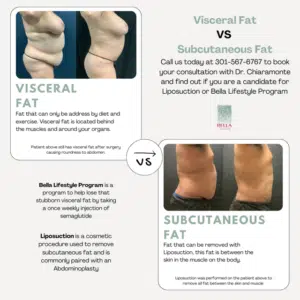Visceral Fat Vs. Subcutaneous Fat

Visceral fat and subcutaneous fat are two distinct types of body fat with different locations, functions, and health implications. Below you’ll learn more about both types of fat and their health implications.
Visceral Fat
Also known as intra-abdominal fat, visceral fat is stored deep within the abdominal cavity and surrounds your internal organs, such as the liver, pancreas, and intestines. It’s located beneath the abdominal muscles and is not visible from the outside. Visceral fat plays a role in protecting and cushioning organs, but excessive amounts can be detrimental.
Health Implications
High levels of visceral fat are associated with an increased risk of several health issues, including:
- Type 2 diabetes
- Heart disease and cardiovascular problems
- High blood pressure
- Insulin resistance
- Certain cancers
- Metabolic syndrome
- Fatty liver disease
Unlike subcutaneous fat, visceral fat is metabolically active and releases substances called cytokines that can contribute to inflammation and insulin resistance, further exacerbating health problems.
Subcutaneous Fat
This is the fat that lies right beneath the skin and can be felt when you pinch your skin. It’s distributed throughout the body, covering areas like the hips, thighs, buttocks, and abdomen. Subcutaneous fat acts as a source of energy, helps regulate body temperature, and provides padding and protection for underlying tissues.
Health Implications
While excess subcutaneous fat is associated with obesity, it is generally considered to be less harmful to health than visceral fat. Subcutaneous fat is not as metabolically active as visceral fat and is not directly linked to the same degree of health problems. However, carrying excess subcutaneous fat can still contribute to joint strain and limit mobility.
Schedule An Appointment
The Bella Lifestyle Program can help you lose visceral fat. All you do for this program is take a weekly injection of semaglutide, which can help you lose that stubborn fat. If you have stubborn subcutaneous fat, liposuction is commonly used to help remove this kind of fat. So if you’re starting your weight loss journey or can’t get rid of stubborn fat, contact Bella Cosmetic Surgery located in Oxon Hill, MD. Call 301-567-6767 or schedule an appointment online.